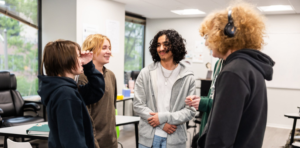Q&A: Founder of new Arlington secondary school lays out priorities
This article first appeared in early March 2017 in the Arlington Sun Gazette and InsideNOVA.
The 2017-18 school year will bring the arrival of a new option in local education with the opening of The Sycamore School – a nonprofit, independent secondary school in Arlington.
The inaugural class will include students in grades 6 to 8, eventually growing to 12th grade. Learning will be self-paced, and the school is “a good fit for students who are bright, curious and may not be thriving in their current school environment,” school officials said.
The Sun Gazette recently queried Dr. Karyn Ewart, the founder and head of The Sycamore School, about how the institution will stand out among public and private education in the community.
Questions and answers are below.
One Arlington political leader used to always ask, when tackling an issue, “What problem are we trying to solve?” What problem, or challenge, in current education is The Sycamore School working to rectify?
Too many of our students become academically uninspired and social-emotionally overwhelmed after they enter middle school, where overcrowding, large class sizes and a focus on rote memorization geared toward SOL preparation is the norm.
Our equal emphasis on social/emotional growth, academic development and civic engagement will ignite a love of learning. Small classes with high-interest learning activities and a personalized, self-paced, experiential learning approach will prevent students from slipping through the cracks like they do at large, overcrowded schools.
How will this school be similar to available options in the local area, and how will it be different?
The Sycamore School approach has some features that are similar to Montessori schooling, such as providing mixed-grade classes where there are opportunities for flexible groupings and peer mentoring. Students and teachers are partners in learning, so teachers serve as a guide and facilitator. We also embrace a whole-child approach, incorporating social and emotional learning into our school day. Our teaching is student-centered, and students have choices of how they work with concepts and demonstrate mastery.
The Sycamore School can implement differentiated instruction where public schools simply cannot, with large class sizes and little time for teachers to build a relationship with each student.
While other private schools may offer small class sizes, we’re unique in offering personalized experiential learning, where students regularly engage in hands-on activities followed by a reflection/debriefing exercise. Our learning is self-paced, which gives students the ability to accelerate, when appropriate, and remediate, if necessary.
Why should a parent take a chance on a new educational offering? And what can the school offer prospective teachers that would be different?
Families who are attracted to The Sycamore School value our ability to provide individualized instruction that centers around high-interest experiential activities. They also appreciate our focus on the whole child, enabling students to gain both organizational and social emotional tools to help them more effectively navigate middle school academics and socialization. Our learning and teaching environment emphasizes community-building and our teachers have freedom to teach creatively without the bounds of standardized testing.
Students graduating from the nation’s K-12 school system (whether public or private) are headed to college, to the workforce or to the military (or a combination). Do you believe they are prepared adequately, and how will The Sycamore School work to improve outcomes?
There is considerable research indicating that students are not leaving high school prepared for college and the workforce. Mainstream schooling is too focused on rote memorization and teaching to a test. Our youth need to learn how to effectively communicate, collaborate, problem solve and think creatively.
At The Sycamore School, we focus on creating a solid foundation of both academic and social/emotional skills, teaching strong organizational skills and cultivating effective time management, so that in high school and beyond, students understand how to think independently and take ownership of their learning. We make learning relevant by showing students how to make connections across content areas, to the real world. We also help students develop 21st-century skills, such as technology and financial literacy and global awareness.
Put yourself in the shoes of a student: What are the biggest challenges facing young people in their daily lives these days, and what role do educational institutions have in addressing them?
Students are stressed out, experiencing anxiety at younger ages, and burning out during formative years that should be filled with curiosity and academic exploration. The current educational climate is too focused on college prep, starting at a very young age, versus letting children be children and keeping learning creative, engaging and playful.
Posted in:

